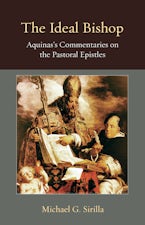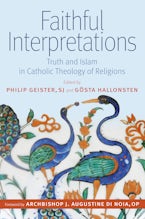- Home
- Thomistic Ressourcement Series
- religion
- The Ideal Bishop
Preparing your PDF for download...
There was a problem with your download, please contact the server administrator.
The Ideal Bishop
Aquinas's Commentaries on the Pastoral Epistles
Thomistic Ressourcement Series
Foreword by J. Augustine Di Noia
Imprint: Catholic University of America Press
St. Thomas Aquinas's commentaries on the Pastoral Epistles are distinctive and overlooked theological resources. These commentaries provide invaluable insights into the exigencies of the exercise of the episcopal office in bringing about the spiritual perfection of the faithful in Christ. The Ideal Bishop includes a review of the theology of the episcopacy found in St. Thomas's principal contemporaries including Peter Lombard, St. Albert the Great, and St. Bonaventure of Bagnoregio. It also provides a conspectus of the same in the integrated corpus of Aquinas along with an introduction to St. Thomas's lectures on the PE, their dating, the provenance of manuscripts, and their method of theological development. But the heart of this book is an examination of the theology and spirituality of the episcopacy found in the lectures on 1 Timothy, 2 Timothy, and Titus. Particular attention is devoted to Aquinas's treatment of the nature, purpose, requisite virtues, disqualifying vices, special duties, and particular graces of the episcopal office.
In his commentary, Aquinas identifies the episcopacy as a state of perfection wherein the prelate ought both to enjoy profound, mystical intimacy with Christ and to love and serve others by leading them to that same intimacy. In so doing, the prelate promotes ecclesial unity and secures his own salvation. Episcopal teaching, governing, and liturgical duties constitute the bishop's fundamental mission which is established and empowered by the act of episcopal consecration received by the bishop elect. Aquinas grounds the efficacy of the bishop's pastoral work on the quality of his interior life. Thus construed the episcopal office demands profound holiness, erudition, and pastoral skill. This work of Thomistic ressourcement substantively benefits the contemporary Church in her project of bringing the perennial truth of the Gospel more efficaciously to all, particularly with respect to the exercise of the episcopal office.
Michael G. Sirilla is associate professor of theology, Franciscan University of Steubenville
"As Sirilla points out, many Thomistic studies on the role of the bishop have exclusively been written on the basis of Thomas's systematic works and have almost completely ignored his work on St. Paul's pastoral letters. Sirilla fills this lacuna by retrieving Thomas's robust understanding of the bishop's interior life and exterior life in the ideal order, an understanding largely forgotten by Thomists. Sirilla's presentation of the main lines of these commentaries can serve as an apt introduction to spur scholars to read the originals and better to prepare them for the challenge of studying the calling of a bishop... his ideas are golden. Being exposed to them in this book will make the journey through the commentaries on Timothy and Titus more invigorating, with clues to better priestly and episcopal lives and, to a lesser degree, the lay life.... Truly, Sirilla has done the Church a fine service in showing theologians and clergy alike the spiritual doctrine hidden in this commentary of St. Thomas."
~Basil Cole, Pontifical Faculty of IC, The Thomist
"This is a first-rate work of the New Evangelization, boldly contextualizing the Angelic Doctor correctly: foremost as a churchman and a curator of souls, and only then as a speculative theologian and philosophical light. The Ideal Bishop reveals what Aquinas discerned in the Pastoral Epistles, seeing how a bishop must first be a man after mystical union with Christ, who can only then expect to fulfill his office of perfecting God’s people in holiness. -"
~Fr. David Meconi, SJ, D.Phil. (Oxon.), Saint Louis University
"Michael Sirilla, in his discerning and insightful reading of Aquinas’s commentaries on the Pastoral Epistles, offers a theologically relevant and spiritually stimulating account of the office of the Bishop within the Church..... Bishops will find this book challenging, but more so, they will find it engaging and heartening. Priests, seminarians and laity alike will not only discover what a bishop is ordained to be, but also why it is so important for them to pray for their bishop, and why they need to support and strengthen him as he shepherds them into the heavenly pasture of Christ’s eternal kingdom. -"
~Thomas G. Weinandy, OFM, Cap., Member of the International Theological Commission


